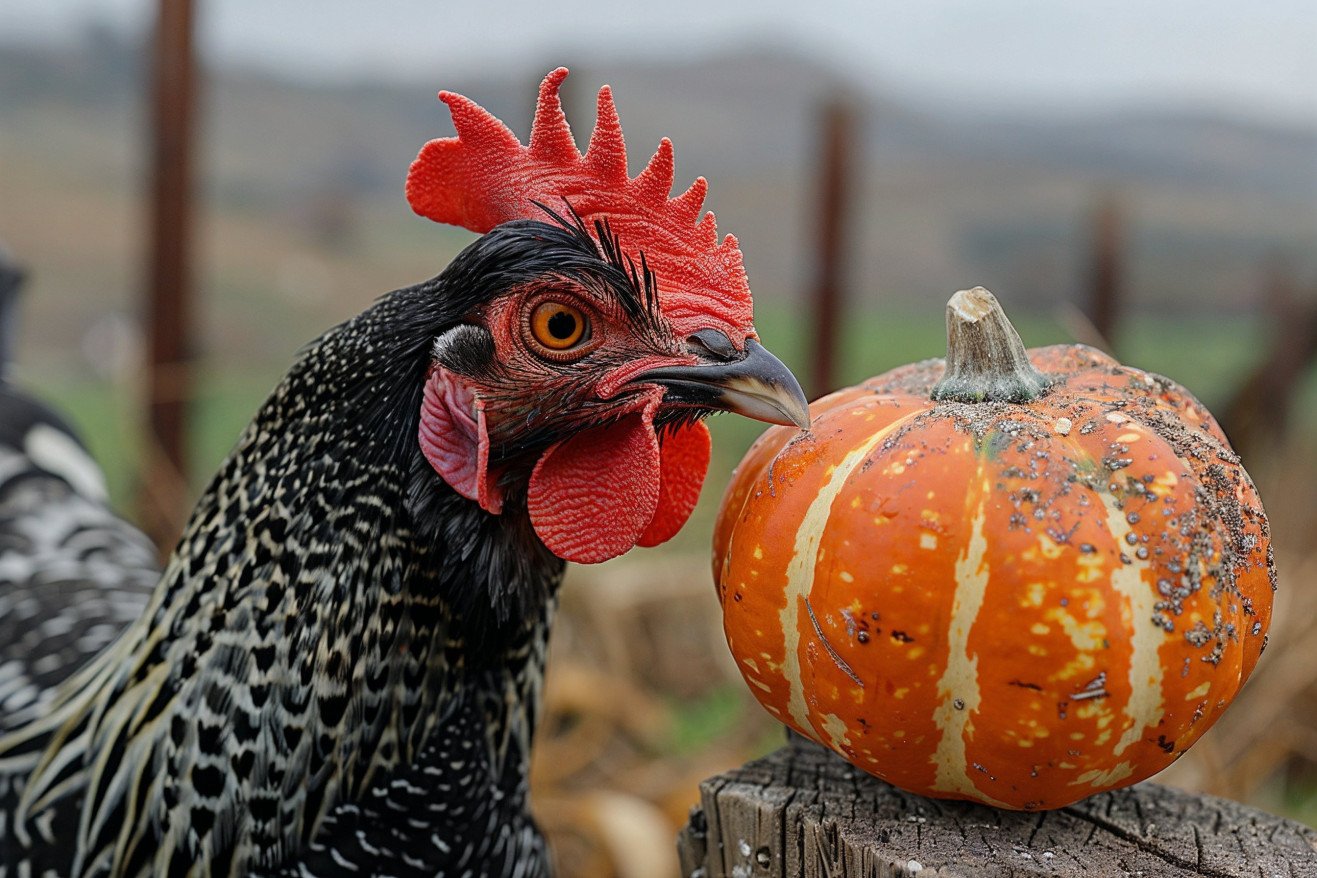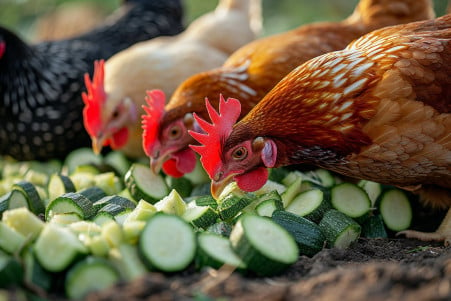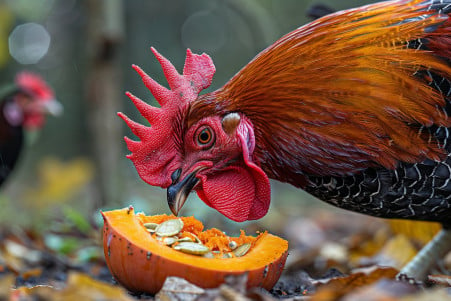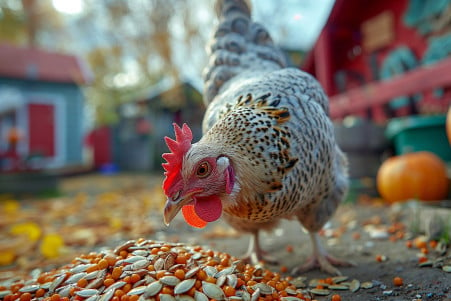Can Chickens Eat Squash? A Look at This Nutritious Treat
22 March 2024 • Updated 20 March 2024

If you're a chicken parent, you may be wondering if it's OK to give your flock some squash, a nutritious and delicious vegetable. The good news is that chickens can eat squash! Squash is a great source of vitamins A and C and fiber for chickens, and the seeds are a nutritious snack that's high in protein and minerals. Just make sure to cook the squash first to avoid any potential bacteria.
In this article, we'll explore the research on the benefits of squash for chickens and how to prepare and feed it to them. You'll also learn about the best types of squash to feed your chickens, how much squash to give them, and fun ways to feed it to them so they can enjoy all the benefits of this super food.
Can chickens eat squash?
Vitamins and Minerals in Squash
Squash is loaded with vitamins and minerals for chickens. As noted by Hobby Farms, squash is a rich source of vitamins A, C, and E, and minerals like iron, magnesium, and potassium. In fact, a 100g serving of butternut squash contains over 300% of the recommended daily intake of vitamin A.
This vitamin A is important for eye health, immunity, egg quality, and stress reduction in chickens. Squash is also high in vitamin C, which is important for immune system support. The fiber, antioxidants like beta-carotene, and minerals like potassium in squash are also important for overall health and egg quality. Although the nutrient content of squash, including pumpkin, butternut, acorn, and zucchini, can vary, all are rich in vitamins and minerals that can benefit your chickens.
Pumpkin Seeds: A Healthy, Natural Dewormer
Pumpkin seeds are a healthy, natural dewormer for chickens. According to CoopCrate, pumpkin seeds are rich in protein, vitamin E, zinc, and other important vitamins and minerals. These nutrients can help boost the immune system, promote growth, and protect against diseases such as E. coli and coccidiosis.
While there is no scientific proof that pumpkin seeds are a natural dewormer, an article from Backyard Poultry suggests that they can help promote a healthy gut and resistance to parasites. In fact, Raising Happy Chickens points out that pumpkin seeds have been recommended as a natural dewormer, but more studies are necessary.
As with any treat, it's important to feed pumpkin seeds to chickens in moderation and as part of a well-rounded diet. However, doing so can help ensure that chickens get important vitamins, minerals, and antioxidants that can help support their health.
How to Prepare and Feed Squash to Your Chickens
While squash can be fed to chickens raw or cooked, cooking it can help to soften the flesh and kill any bacteria. The Self Sufficient HomeAcre suggests that baking or steaming are the best ways to cook squash, and that it should be done without any oils, seasonings, or spices. After cooking, mashing or dicing the squash can make it easier for chickens to eat and digest.
If you're feeding your chickens raw squash, it's best to cut it up to avoid choking and to make it easier for the chickens to eat. Abundant Permaculture even points out that winter squash can be stored and used as a healthy chicken feed for months. In fact, Backyard Poultry explains that you can feed chickens the seeds, guts, and scraps of pumpkins that have been carved into jack-o-lanterns.
Everything in Moderation: How to Incorporate Squash Into a Chicken's Diet
While squash is a nutritious food for chickens, it should not be the main component of their diet. As noted by BackYard Chickens, squash does not contain the protein that chickens need to be healthy. Therefore, it's important to make sure that chickens are getting most of their nutrition from a well-balanced diet that includes high-quality chicken feed.
CS-TF suggests that squash can be fed to chickens as a healthy treat or supplement once or twice a week, but it should not make up more than 10% of their daily intake. Overconsumption of squash can lead to digestive problems, nutritional imbalances, and even vitamin A toxicity.
In addition, to ensure that the coop stays clean and pest-free, it's important to remove any leftover squash after feeding it to chickens. As mentioned by The Homesteading Hippy, leaving leftovers in the coop can attract pests. So while squash can be a healthy addition to a chicken's diet, it's important to make sure that it's being fed to them in moderation and as part of a balanced diet.
Squash Leaves and Vines: Can Chickens Eat Them?
While chickens can eat the flesh and seeds of squash, the leaves and vines are another story. According to a thread on BackYard Chickens, chickens will eat the squash itself, but the leaves are questionable. The very limited research indicates that the leaves may be toxic or at least cause digestive upset in chickens.
As a result, it is generally best to avoid feeding squash leaves and vines to your chickens. That said, if you want to try feeding the leaves to your chickens, Angie The Freckled Rose recommends introducing them slowly and watching your chickens for any signs of distress. Feeding your chickens a variety of other safe greens and veggies is a much better way to supplement their diet.
Conclusion: Adding Squash to Your Flock's Diet
Squash is a healthy and beneficial food for chickens, as it is full of important vitamins, minerals, and antioxidants. The seeds are especially good for chickens and may even help with deworming, but it's important to feed them in moderation.
It's also important to make sure that you prepare the squash properly and feed it to your chickens in the right amounts. While the leaves and vines of the squash plant are not safe for chickens to eat, the flesh and seeds can be a helpful addition to a well-rounded diet. Feeding your chickens squash can help improve their health and the quality of their eggs.


